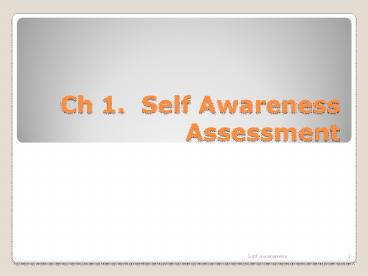Ch 1. Self Awareness Assessment - PowerPoint PPT Presentation
Title:
Ch 1. Self Awareness Assessment
Description:
Ch 1. Self Awareness Assessment * Self Awareness Please answer in reflect your attitudes and behavior as they are now. Rating scale: 1. Strongly disagree. – PowerPoint PPT presentation
Number of Views:535
Avg rating:3.0/5.0
Title: Ch 1. Self Awareness Assessment
1
Ch 1. Self Awareness Assessment
2
- Please answer in reflect your attitudes and
behavior as they are now. - Rating scale
- 1. Strongly disagree.
- 2. Disagree.
- 3. Slightly disagree.
- 4. Slightly agree.
- 5. Agree.
- 6. Strongly agree.
3
- Assessment
- I seek information about my strengths and
weakness from others as a basis for self
improvement. - When I receive negative feedback about myself
from others, I do not get angry or defensive.
4
- In order to improve, I am willing to be self
disclosing to others (that is, to share my
beliefs and feelings). - I am aware of my personal learning style and how
I learn best.
5
- I have a good grasp of what it means to
- be emotionally mature, and I demonstrate
that capability. - I have a good sense of how I cope with situations
that are ambiguous and uncertain.
6
- I have well developed set of personal standards
and principles that guide my behavior. - I feel in charge of what happens to me, good and
bad.
7
- I seldom, If ever, feel angry, depressed, or
anxious without knowing why. - I am conscious of the areas in which conflict and
friction most frequently arise in my interactions
with others.
8
- I have a close personal relationship
- with at least one other person with whom I
can share personal information and personal
feelings.
9
- Please
- 1. Read Chapter 1.
- 2. Download from
- http//careermanagementjababeka.wordpress.c
om
10
A Hierarchy of Personal Life- Management Skills
- 1. Self awareness.
- 2. Setting priorities and goals.
- 3. Managing time.
- 4. Managing stress.
- Problems gtgtgtgtgtgtgtSymptom
- Strategic gtgtgtgtgtgtgtTactical
11
Important Areas of Self Awareness
- Five core aspects of self awareness
- (Figure 1.2. Page 64)
- - Emotional intelligence,
- (identifies emotional awareness and control).
- - Values,
- (identifies personal standards and moral
judgment). - - Learning style,
- (identifies information acquisition and
evaluation). - - Attitudes toward change,
- (identifies adaptability and responsibility)
- - Core self evaluation,
- (identifies underlying personality
attributes)
12
Important Areas of Self Awareness(Emotional
Intelligence)
- Emotional intelligence
- 1. The ability to diagnose and recognize
- your own emotions.
- 2. The ability to control your own
- emotions.
- 3. The ability to recognize and diagnose
- the emotions display by others.
- 4. The ability to respond appropriately
- by those emotional cues.
13
Important Areas of Self Awareness(Values)
- Values
- - People especially are not aware that
- they hold some values as being more
- important than others.
- - The values are affected by such
- -- nationalities,
- -- ethnic groups,
- -- industries,
- -- organizations.
14
Important Areas of Self Awareness(Values)
- Cultural values, Table 1.1. Page 67.
- Example
- Value dimension is Universalism
- Explanation Societal rules and norms are
valued. - Example countries US, Switzerland, Norway,
Sweden. - other peoples behavior is governed by
universal standards such as - do not lie - - do not cheat
- - do not run a red
light
15
Important Areas of Self Awareness(Learning Style)
- Each of us is constantly being exposed to an
overwhelming amount of information. - Learning style refers to the inclination each of
us to perceive, interpret, and respond to
information in a certain way. - Learning style is based on two key dimensions
- 1. The manner in which you gather
information - 2. The way in which you evaluate and act on
information.
16
Important Areas of Self Awareness(Learning Style
(continued))
- One the main reasons we focus on learning style
is - To be successful, everyone must be constantly
learning.
17
Important Areas of Self Awareness(Learning Style
(continued))
- Two dimensions of learning
- 1. The information gathering information
- Concrete Experience (CE)
- (learn by tangible, concrete,
sensual - encounters).
- Abstract Conceptualization (AC)
- (learn when they encounter ideas and
- theories and then have a chance to
think - about them logically and
analytically).
18
Important Areas of Self Awareness(Learning Style
(continued))
- Two dimensions of learning
- 2. The information response
- reflective observation (RO),
- (after encountering information,
- inclined to examine it from
- different perspectives).
- active experimentation (AE),
- (inclined to act immediately on the
- information they receive).
19
Important Areas of Self Awareness(Attitudes
Toward Change)
- Attitude toward change
- 1. Tolerance of ambiguity,
- (the extent to which individuals are
- threatened by or have difficulty
- coping with situations that are
- ambiguous).
- 2. Locus of control,
- (attitude people develop regarding the
- extent to which they are in control of
- their own destinies).
20
Important Areas of Self Awareness(Core Self
Evaluation)
- Core self evaluation
- overall positive self regard (the extent to
which people value themselves and feel proficient
as individuals).
21
Important Areas of Self Awareness(Core Self
Evaluation)
- Homework
- Answers in detail the questions no 1 4, Page
92-93.































